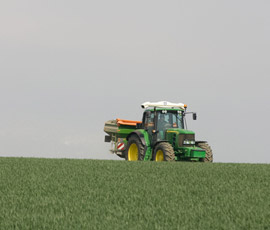Nitrogen-fixing bacteria could cut fertiliser bills

Nitrogen-fixing bacteria could cut nitrogen fertiliser bills at least in half and soon be seen be seen in commercial oilseed rape and wheat crops in two to three years.
Research work at Nottingham University has isolated the bacteria from sugar cane and put them into mainstream arable crops with encouraging results.
This N-Fix technology gives crops the ability to fix nitrogen from the atmosphere rather than rely on synthetic nitrogen fertiliser applied to a growing crop, and does not use genetic modification.
The university’s Edward Cocking introduced the bacteria into turf grass and was able to cut synthetic nitrogen needs by at least 50%, and is this season looking at wheat and oilseed rape.
“The potential is enormous and it could lead to the progressive reduction in the need for nitrogen fertiliser,” Professor Cocking told the Farmers Weekly. After spending years trying to transfer the ability of legume crops, such as peas and beans, to fix atmospheric nitrogen with little success, he turned to sugar cane instead.
“The potential is enormous and it could lead to the progressive reduction in the need for nitrogen fertiliser.”
Professor Edward Cocking, Nottingham University
He isolated a strain of nitrogen-fixing bacteria from sugar cane which he was able to introduce into the cells of arable crops grown in Britain.
This technology comes at a cost of about 2% of a typical farm nitrogen fertiliser bill, and would also cut fertiliser transportation costs, he says.
The bacteria is introduced to the plant via a seed coating along with sugar, which encourages the bacteria to enter the cells of the plant.
“The bacteria love a little bit of sugar and it helps them to make micro-punctures and enter inside the cells,” says Prof Cocking, who is the director of the University of Nottingham’s Centre for Crop Nitrogen Fixation.
He has used the seed dressing this season on winter oilseed rape and wheat and says the trials are “looking hopeful”, but he will need full data before making a conclusion.
He believes that crops may still need a little synthetic nitrogen as well as the seed coating treatment, but the reduction in fertiliser use will be “quite dramatic”.
The bacteria were first discovered in Brazilian sugar cane crops where farmers had noticed that they didn’t need to apply much nitrogen fertiliser to get good harvests.
The N-Fix technology has been licensed to Azotic Technologies to develop the system globally.

